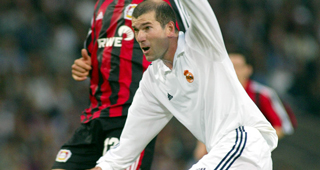Fourth of July and the United States is playing Brazil at Stanford Stadium in the Round of 16 of the 1994 World Cup. Alexi Lalas, Cobi Jones, Tab Ramos, Tony Meola and company were fortunate to merely be in the same stadium as Brazil, but it took the eventual champions until the 72nd minute before Bebeto broke through for the lone goal of the match.
This was the second soccer match I had ever attended, with my first being a Group Stage rout of Cameroon by Brazil two weeks earlier.
That World Cup was an important breakthrough for the United States’ relationship with soccer, but it was still early days and the technology of the time wouldn’t allow us to see below the tip of the iceberg. It would take the arrival of club competition on television and the ability to read about it extensively on the Internet for it to become fully suitable as an object of fandom to those of us in the United States.
NBC is now paying $83 million per season to broadcast the Premier League, while Fox recently renewed its contract with UEFA for the Champions League. The incubation period for soccer in North America has been over for several years.
Depending on your cable package or streaming deftness, the number of soccer matches you can watch per week now is immense, but it still felt more like rare event viewing in 2002 when I became obsessed with Real Madrid and their march toward the Champions League Final. Real had won it in 1998, beating Zinédine Zidane and Juventus, and again in 2000 against Valencia, but this was Zidane’s first season at the Bernabéu following a then-world-record transfer fee of $66 million.
Real had acquired Zidane as a follow-up to Luis Figo from Barcelona in a $60.1 million transfer one year earlier and it was remarkable the depth of talent on the club at that time.
Zidane’s goal for the ages in the 45th minute would stand as the game-winner to break a 1-1 tie against Bayer Leverkusen. Zidane hit the left-footed volley on a Robert Carlos lob pass that seemed to float in the air forever into the left top corner of the net.

Zidane played with the type of imagination and grace that transcends sports and this was when he was at the supreme peak of his powers.
The World Cup opened two weeks later, with Ronaldo and Ronaldinho leading Brazil to an anticlimactic 2-0 win over Germany in the final. Ronaldo scored the lone goal in Brazil’s 1-0 win over Turkey in the semifinals and scored twice in the final.
When I arrived in Spain a few days later on the fourth of July in 2002, eight years after that World Cup in the United States to begin a summer study abroad, Ronaldo was on the front page of every major newspaper with rumors of his looming transfer from Inter Milan to Real Madrid.
Shaquille O’Neal and Kobe Bryant had just completed their threepeat with the Lakers, while the Yankees were in the midst of their most dominant streak since the early 1960s, but a club loading up like Real with so many of the world's best players was still astonishing.
David Beckham arrived in 2003 from Manchester United, which retroactively marked a level of absurdity for the Galácticos strategy and results began to elude Real. They had won La Liga in 2003, but the Champions League became a wasteland just as Barcelona began its ascendancy.
The discernible takeaway was that the best soccer players in the world have the opportunity to be teammates like they're on an All-Star team and they do so relatively early in their careers. Even if they don’t come up through the academy of a major club like Lionel Messi with La Masia, they rarely toil for more than a season or two with duds before a transfer.
Wayne Rooney became a teenage sensation for Everton in 02-03 and was sold to Manchester United ahead of the 04-05 season for £25.6 million.
LeBron James, just a few months older than Rooney, played with the Cleveland Cavaliers for seven seasons from 03-04 until 09-10 before he could move on to a more viable situation. Rooney won three Premier League titles and one Champions League title with United during that time in which the Cavaliers reached the Finals just once.
LeBron had to go to China for the 2008 Olympics to fully realize what his basketball life would be like to play with similarly talented players. Messi and Cristiano Ronaldo are slumming it when they leave their loaded club teams to play for love of country in comparative superstar loneliness.
I neither prefer institutional parity or dynasties in sports, but the ability to watch the unquestioned best at their craft almost always increases the entertainment quotient.
European soccer is undergoing considerable change with the implementation of Financial Fair Play Regulations, as well as a similar advanced analytics that we have also seen in basketball, baseball and football.
The FFP was triggered in part due to the new American owners bringing over a closed system of US-style sports socialism. It remains unclear what impact it will have in the long-term as many have doubts about its sustainability and the nuance of how teams will work within those constraints.
The advanced analytics has helped anyone who chooses to embrace it improve their understanding of the game, while also not completely compromising ‘the beautiful game’ aesthetics that rightly remain so beloved. There is considerable randomness and a level of unpredictability to soccer, but take-ons per 90, total shots ratio, key passes, etc. have entered the lexicon to make the game more vivid.
RealGM went live nearly 14 years ago as a response to NBA trade rumors that were reported in the mainstream media without any semblance of plausibility. Trade Checker made reporters accountable to the rules of the collective bargaining agreement and we could then have a more intelligent conversation about player movement, which we found is one of the most exciting aspects of following sports on the granular level.
Unlike the very rules obsessed NBA, soccer remains susceptible to absurd rumors since anything remains theoretically possible with its open, unrestricted system.
We are helpless in inoculating against those types of reports as we did with the NBA, but our aim in expanding into soccer is to bring a similar spirit with as much focus dedicated to the how and why of success and failure of clubs and players to Wiretap, along with original articles that focus heavily on roster composition. We want to offer precise information that makes you as prepared and knowledgeable as soccer sporting directors.
We are hopeful that our experience covering basketball, baseball and football from the perspective of actual decision-makers adds a new viewpoint of value to the world of soccer/fußball/fútbol/football.



